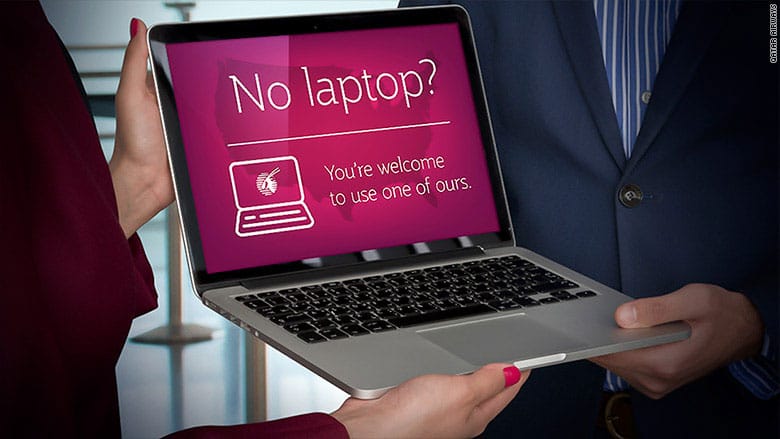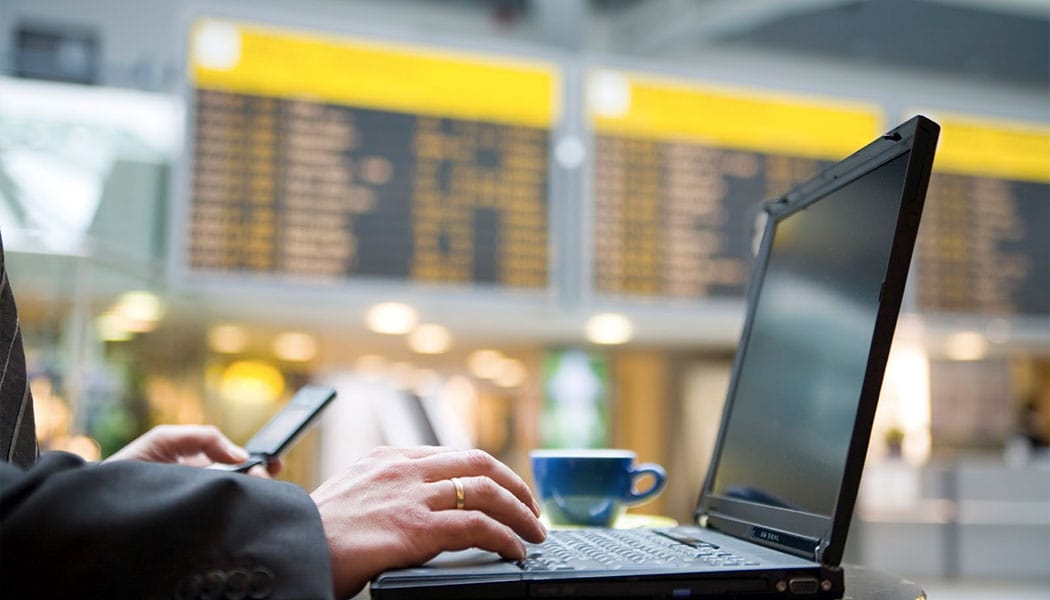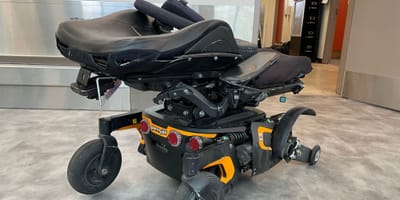In March, the United States banned electronics larger than a cell phone on flights from eight countries in Africa and the Middle East. As a person who travels with a power wheelchair, I was afraid that I might be forced to turn over fragile equipment like my power transformer and offboard wheelchair charger at the airport.
Procedures for Banned Electronics
Earlier this month, I flew on a Qatar Airways itinerary from Cairo, Egypt to Miami, Florida, with a connection at Hamad International Airport in Doha, Qatar. My second flight, from Doha to Miami, was subject to the in-cabin electronics ban, and I had to surrender my laptop at the boarding gate. I was permitted to carry my laptop on the first flight, between Cairo and Doha.

Many travelers, myself included, have expressed concern about putting their laptops in the cargo hold, but Qatar Airways has instituted a program that ensures their safety. A packing station was set-up outside and to the left of the gate area. Airline staff used bubble wrap and packed the banned electronic devices into cardboard boxes, placing each box inside a plastic bag. A zip tie was used to close the plastic bag – a measure designed to prevent tampering, I assume.
Security Check at the Boarding Gate
With my boxed-up laptop in hand, I proceeded to the gateside security checkpoint. As part of this additional screening, carry-on baggage is x-rayed (to check for electronics) and passengers go through a metal detector or, in my case, a light pat-down.
My power transformer and wheelchair charger, packed inside my carry-on, were flagged and pulled aside. I explained to the security staff that they were devices for my wheelchair. After a test for explosives, they were cleared to carry-on. My GoPro camera and portable power bank (for charging my iPhone) made it through without a second look.
The security procedure was supervised by an official of the U.S. government. I spoke with him briefly through an exchange of pleasantries. While I did not ask who he works for, I suspect it is an agency of the U.S. Department of Homeland Security or Customs and Border Protection.
After clearing security at the gate, I presented my boarding pass to the gate agent. Luggage tags were printed and affixed to my wheelchair and the box containing my laptop. The gate agent asked me to sign waiver of liability for the laptop, but I refused. I explained that I was uncomfortable with signing any waiver due to the fact that I was also checking an expensive power wheelchair. After a few minutes, I was allowed to proceed without having signed the waiver. I then handed over the laptop box to be placed as checked luggage in the cargo hold.

After boarding the aircraft, I looked outside and saw the bags/boxes of banned electronics being loaded into a cargo container. This set my mind at ease quite a bit, as I knew my laptop wouldn’t be victim to a set of golf clubs falling on top of it.
Loaner Laptops for Business Class Passengers
Because I was traveling in business class, I asked about the loaner laptops that Qatar is offering on flights to the United States. CNN reported on this program some weeks ago, and Qatar Airways has marketed it quite strongly.

Unfortunately, loaner laptops are only provided to passengers traveling on wi-fi equipped aircraft. Because the Qatar Airways Boeing 777 fleet is not yet equipped, my flight to Miami was ineligible. Currently, only passengers flying on the Airbus A350 from Doha to Boston, New York and Philadelphia will be able to borrow a laptop. This means that the airline’s longest distance flights to the U.S. are excluded – notably Dallas, Houston, Los Angeles and, of course, Miami.
Collecting Electronics on Arrival
After landing in Miami, my gate-checked power wheelchair was returned to the door of the aircraft. Although my laptop had also been checked at the gate, it was returned at baggage claim. I was happy to see that staff were assigned to guard the boxes containing electronics, only turning them over after checking identification. y laptop was removed from the box and I was given an opportunity to check that it was working.
Final Thoughts
In the days following the ban, we learned that it was put in place due to a legitimate threat. If you remember, a laptop bomb exploded and blew a hole in the side of a Daallo Airlines plane last year.
While banning electronics in the cabin may reduce this threat, some have suggested more nefarious motives. Gary Leff, founder of View from the Wing, writes:
It has the effect of giving United, Delta, and American what they’ve been lobbying for over the past two years — hobbling their major competition from the Gulf.
Although my experience of traveling under the ban has been limited, I have noticed reduced passenger loads on affected flights. Business Class on my Qatar Airways flight to Miami was nearly empty, a surprising anomaly given that the flight is often sold out.
One of the affected carriers, Emirates, cited this weakened demand as it 25 flights per week from its U.S. schedule. It’s difficult to fill airplanes with business travelers while requiring them to go without laptops and tablets for 15 or more hours.
All that said, my experience as a wheelchair traveler under the ban was good. I was permitted to carry-on the fragile equipment for my wheelchair, thereby avoiding a potential nightmare scenario. And, while it was frustrating to be without my laptop on such a long flight, it arrived safely and in one piece. Next time I travel on Qatar Airways to the U.S., I’ll be sure to book a flight that offers wi-fi and a loaner laptop.
Have you traveled with a disability under the electronics ban?
Were you allowed to carry-on your medical equipment?
Let me know in the comments below!















